- Joined
- Nov 13, 2014
- Messages
- 272
- Points
- 0
13,000 pro-democracy activists take to the streets as first post-Occupy march kicks off
PUBLISHED : Sunday, 01 February, 2015, 2:39pm
UPDATED : Sunday, 01 February, 2015, 10:42pm
Tony Cheung, Ernest Kao, Samuel Chan and Phila Siu
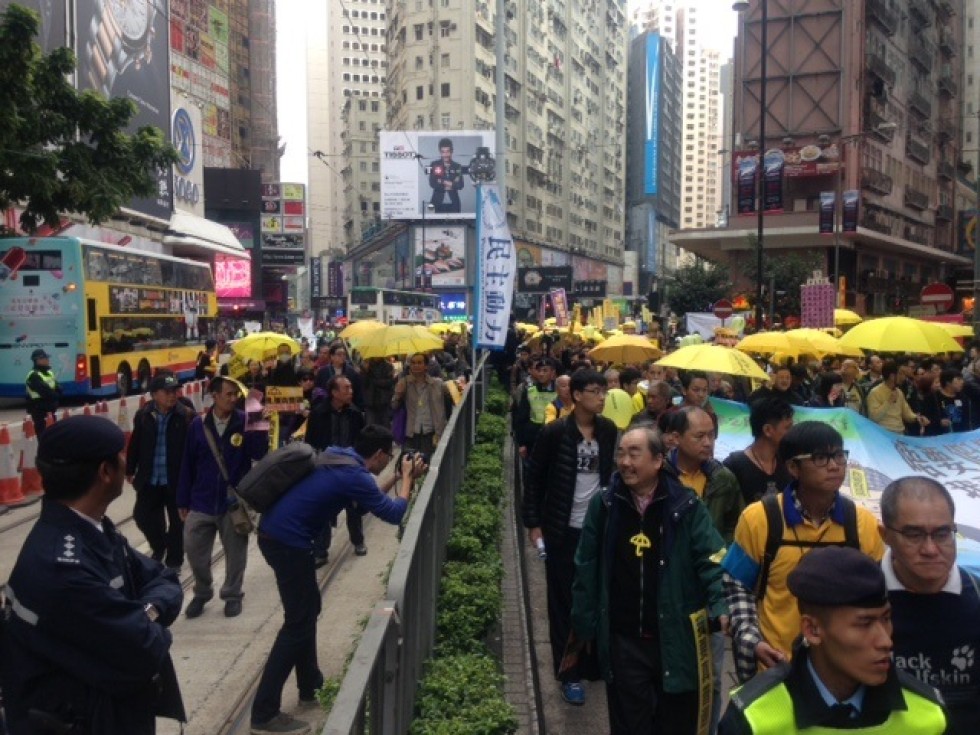
Police opened four lanes, one more than usual, outside the Sogo department store, in an apparent effort to avoid the location from turning into a bottleneck. Photo: Tony Cheung
Thousands of pro-democracy activists took to the streets of Hong Kong today during the first major post-Occupy Movement mass rally this afternoon.
Supporters and members of the Civil Human Rights Front gathered at Victoria Park before 2pm while stickers, banners, placards and balloons all paying homage to the "Umbrella Movement" abounded. At 2.20pm, the march began with the head of the rally leaving Victoria Park's eastern entrance through Tin Hau.
Leading the charge were key figures of the Occupy Central movement including Benny Tai Yiu-ting, Chan Kin-man and Reverend Chu Yiu-ming. Others at the front included Democratic Party founding chairman Martin Lee Chu-Ming as well as Daisy Chan Sin-Ying.
The Civil Human Rights Front put the turnout at 13,000, double the police estimate of 6,600 marchers setting out from Victoria Park and 8,800 at the march's peak.
The University of Hong Kong’s Public Opinion Programme estimated that the turnout was about 11,000 to 12,000 – lower than the New Year’s Day march in 2013 and 2014.
"The [turnout] is indeed fewer than what we expected, but this only shows that Hongkongers are no longer satisfied with conventional ways of protest," Daisy Chan Sin-Ying said.
"It doesn't mean Hongkongers will pocket whatever [proposal] that's on offer," she said, "We will review whether the people want new ways to pressure the government... If the people are tired with taking part in marches; it’s not the front which is in trouble, but the government... I am confident Hongkongers will show up again when the right moment comes."
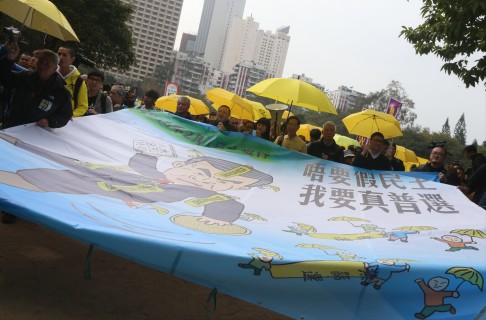
Protesters hold a head banner that appeals for "genuine universal suffrage" as they march from Victoria Park. Photo: Felix Wong
March participants held up a large banner with a caricature of Chief Executive Leung Chun-ying and the words "reject fake democracy, we want real universal suffrage" sprawled on it. As more people joined the procession in the later afternoon, Chan gave an emotional speech, calling on "the support of everyone".
"We can't depend our fight for democracy on the teenagers...I hope I will be able to see real democracy in my life," she said. "We won't stop until genuine universal suffrage comes."
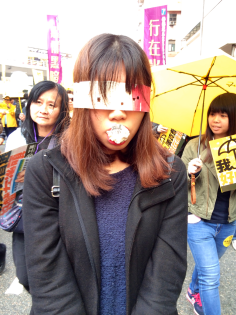
Jessie Tam, a 21 year-old university student, joined the protest with pieces of paper covering her eyes and stuffed in her mouth. "It is to echo the government's attempt to silence us," Tam explained. Photo: Tony Cheung
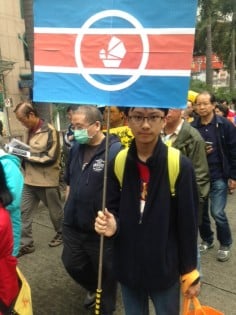
14-year-old Gabriel Lam designed a "North Korean" Hong Kong flag."Hong Kong is becoming more and more like North Korea," Lam said, "because the democracy that officials talk about seems fake just like North Korea, which also boasts to be a 'democractic' people's republic." Photo: Tony Cheung
Housewife Carol Leung, 34, who joined the march alone, said she was marching because she was "afraid" for her 8-year-old son’s future.
"I don’t want him to grow up in a city where he will go out on the street and suddenly be beaten by the police. I am afraid that Hong Kong will become like [mainland] China ," she said. "I am pushing him to study harder so he can go overseas for school when he is older."
As the marchers proceeded past the Hong Kong Central Library, an 83-year-old man hurled insults at them, screaming: "The SAR government is already treating us so well. We have freedom of speech and the government has given us sweeteners before when there was a surplus. What else do you want? Hong Kong has never been more prosperous before."
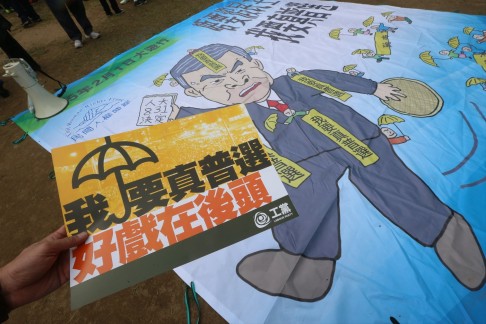
A poster from the Labour Party that appeals for "genuine universal suffrage". Photo: Felix Wong
Eric Fok, who works in the financial sector, said he supported the marchers but doubted if rallies could help achieve genuine universal suffrage.
"I support them. I support the Umbrella Movement...and I didn't understand why [Chief Executive] Leung Chun-ying hit out at the University of Hong Kong’s student magazine Undergrad. Hong Kong is becoming like the mainland," he said as he looked upon the marchers outside the library.
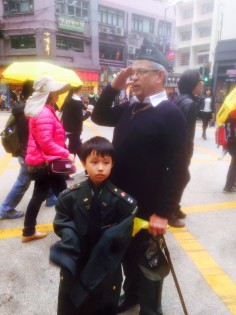
Pastor and former US Army veteran Bob Kraft. Photo: Ernest Kao
Others, like pastor and former US Army veteran Bob Kraft, saluted the protesters as they passed through Causeway Bay.
Kraft, who made a name as "the pastor of Civic Square" during the 79-day Occupy Movement and is no stranger to local protests, said he wanted Hong Kong to have freedom from fear. He said the turnout seemed lower than he expected but the important thing was that people had come for the right reasons.
"Many people in Hong Kong are becoming afraid. Afraid of the government, the police, of teachers... Citizens should not be afraid to make their own choices," said Kraft, who was stationed in Berlin, Germany during the latter part of the Cold War. "We are all here for the moment. You can't take away someone's rights in their heart."
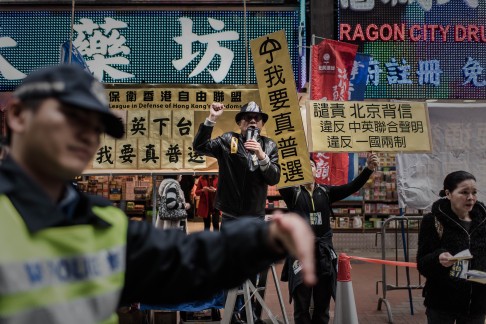
A policeman direct pedestrians as demonstrators shout slogans before the Sunday march for democracy in Hong Kong. Photo: AFP
Meanwhile, shops and retailers remained divided on whether protests would be an effective force for change.
"Many people have become antagonistic to such demonstrations," said Alan Yu King-bun, a shop manager at Ko Lai Tong, a Korean snack shop on Yee Wo Street, which opened under a short-term lease just a week after the Occupy camp on the same road was cleared.
"It's annoying, it affects our business and to be honest, they won't be able to achieve anything."
He said he was concerned that another round of civil disobedience could return to Causeway Bay if an Occupy-style movement were to break out today. Although Yu's store is on a temporary lease, monthly rents for the ground floor shop remain in the area of HK$100,000, and mainland tourists make up about 70 per cent of business.
"Many students are already done with their [winter] exams so there is a higher risk right now. We are concerned but there's nothing much we can do."
Jason Pang, the owner of bag and luggage store The P&L Company on nearby Causeway Road was more sympathetic.
"They have an objective so even if it did affect our business a bit, we'll still accept it," said Pang. He said many people were frustrated with the government, including small business-owning middle class citizens like himself.
"The government must look out for all strata of society, not just their rich friends."
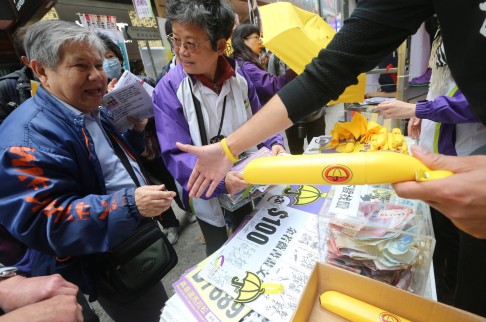
Yellow umbrellas from Hong Kong's Occupy Movement are passed out to marchers. Photo: Felix Wong
Around 6.15pm, a group of People's Power members split off from the main rally and appeared at Government House, the residence of the Chief Executive, to demand genuine universal suffrage.
The group, led by Albert Chan Wai-yip and other members including Tam Tak-chi and Erica Yuen Mi-ming, attempted to stick "fai chuns" - small red banners usually written with lucky messages - with the words "I want real universal suffrage" onto the compound's walls.
Previously, Chan Wai-yip had said that People's Power members were going to pay their Lunar New Year blessings to Leung Chun-ying two weeks early and urged citizens to do the same.
League of Social Democrats' activist Lui Yuk-lin, also known as the female "Long Hair" for her radical antics similar to Leung Kwok-hung, threw eggs and hell money, while guards quickly shut the gate of the compound and dozens of police pushed the protesters away from the entrance.

Members of People's Power at Government House. Photo: Ernest Kao
A police source told the Post that about 2,000 police officers fanned out between Causeway Bay and Central to monitor the mass rally, readying reinforcements to deploy in case of major unrest. These included officers who were involved in the Solarpeak operation that dealt with the Occupy protests, the source said.
During the rally, police officers stood on guard every few metres, but appeared to be less tense than they were during the Occupy sit-ins. The protesters also did not chant slogans to insult the officers, in contrast to when Occupiers accused officers of being "black police" during last year's protests.
Chan, however, said that police "stopped at least three organisations" from setting up booths along the route. These three organisations included the Democratic Party, Labour Party and one concern group.
"In the past, booths could be set up as long as they occupied only one lane of the street," she said.
Chan said the Civil Human Rights Front currently has no plans to stage any civil disobedience actions but it would offer its full support to Democratic Party lawmaker Albert Ho Chun-yan's resignation plan to trigger a de-facto referendum later this year.
She also added that the Front might not organise the annual march on July 1 if police imposed unprecedented restrictions deemed unreasonable. Instead, the Front may organise a rally or protest in other "more creative" ways if police are uncooperative.
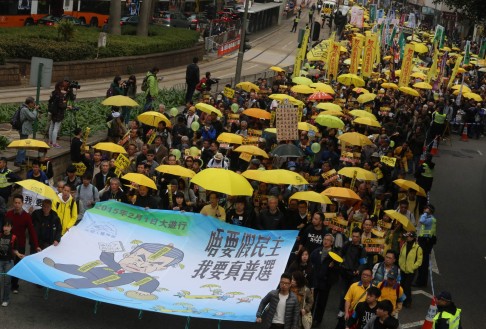
Up to tens of thousands of people took to the streets in the first major rally since the Occupy Central sit-ins. Photo: Felix Wong
Meanwhile, the pro-government group Defend Hong Kong Campaign announced that its members would call for residents to support the government’s political reform efforts in different districts on Sunday, but would not be doing so in Wan Chai or Causeway Bay to avoid clashing with marchers.
In response to the rally today, a government spokesman said the following: "The Hong Kong Special Administrative Region (HKSAR) Government calls on all sectors of the community to adopt an accommodating, rational and pragmatic approach, as well as an inclusive attitude to express views [and] to forge consensus so that 5 million eligible voters can elect the Chief Executive by universal suffrage through 'one person, one vote' in 2017."
